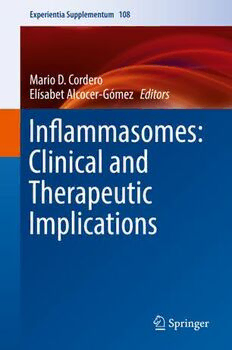
Inflammasomes: Clinical and Therapeutic Implications PDF
Preview Inflammasomes: Clinical and Therapeutic Implications
Experientia Supplementum 108 Mario D. Cordero Elísabet Alcocer-Gómez E ditors Infl ammasomes: Clinical and Therapeutic Implications Experientia Supplementum Volume 108 Moreinformationaboutthisseriesathttp://www.springer.com/series/4822 (cid:129) Mario D. Cordero Elísabet Alcocer-Gómez Editors fl In ammasomes: Clinical and Therapeutic Implications Editors MarioD.Cordero ElísabetAlcocer-Gómez DepartmentofPhysiology DepartamentodePsicologíaExperimental InstituteofNutritionandFoodTechnology FacultaddePsicología “JoséMataix”,BiomedicalResearch UniversidaddeSevilla Center(CIBM),UniversityofGranada Seville,Spain Armilla,Spain ISSN1664-431X ISSN2504-3692 (electronic) ExperientiaSupplementum ISBN978-3-319-89389-1 ISBN978-3-319-89390-7 (eBook) https://doi.org/10.1007/978-3-319-89390-7 LibraryofCongressControlNumber:2018951069 ©SpringerInternationalPublishingAG,partofSpringerNature2018 Thisworkissubjecttocopyright.AllrightsarereservedbythePublisher,whetherthewholeorpartofthe materialisconcerned,specificallytherightsoftranslation,reprinting,reuseofillustrations,recitation, broadcasting,reproductiononmicrofilmsorinanyotherphysicalway,andtransmissionor information storageandretrieval,electronicadaptation,computersoftware,orbysimilarordissimilarmethodology nowknownorhereafterdeveloped. Theuseofgeneraldescriptivenames,registerednames,trademarks,servicemarks,etc.inthispublication doesnotimply,evenintheabsenceofaspecificstatement,thatsuchnamesareexemptfromtherelevant protectivelawsandregulationsandthereforefreeforgeneraluse. The publisher, the authors and the editors are safe to assume that the advice and information in this bookarebelievedtobetrueandaccurateatthedateofpublication.Neitherthepublishernortheauthorsor theeditorsgiveawarranty,expressorimplied,withrespecttothematerialcontainedhereinorforany errorsoromissionsthatmayhavebeenmade.Thepublisherremainsneutralwithregardtojurisdictional claimsinpublishedmapsandinstitutionalaffiliations. ThisSpringerimprintispublishedbytheregisteredcompanySpringerNatureSwitzerlandAG Theregisteredcompanyaddressis:Gewerbestrasse11,6330Cham,Switzerland Acknowledgments Theeditorswanttothankalltheauthorsforthetremendouseffortanddedicationto thedevelopmentofthisbookaswellasthehighlevelofchapters. v Contents 1 InflammasomesinClinicalPractice:ABriefIntroduction. . . . . . . . 1 ElísabetAlcocer-Gómez,BeatrizCastejón-Vega, MacarenaLópez-Sánchez,andMarioD.Cordero 2 TheInflammasomesinCardiovascularDisease. . . . . . . . . . . . . . . . 9 GerardusP.J.vanHoutandLenaBosch 3 InflammasomesinCNSDiseases. . . . . . . . . . . . . . . . . . . . . . . . . . . 41 EduardoA.Albornoz,TrentM.Woodruff,andRichardGordon 4 LungDiseases. . . . . . . . . . . . . . . . . . . . . . . . . . . . . . . . . . . . . . . . . 61 SaleelaM.Ruwanpura,SarahRosli,andMichelleD.Tate 5 TraumaticInjury. . . . . . . . . . . . . . . . . . . . . . . . . . . . . . . . . . . . . . 85 BornaReljaandJohann-PhilippHorstmann 6 InflammasomeinthePathogenesisofPulmonaryDiseases. . . . . . . 111 FengyingXu,ZongmeiWen,XueyingShi,andJieFan 7 InflammasomeandOralDiseases. . . . . . . . . . . . . . . . . . . . . . . . . . 153 PedroBullon,LuisE.Pavillard,andRafaeldelaTorre-Torres 8 InflammasomesintheKidney. . . . . . . . . . . . . . . . . . . . . . . . . . . . . 177 HollyL.Hutton,MalihaA.Alikhan,andA.RichardKitching 9 Pro-InflammatoryActionsofRedBloodCell-DerivedDAMPs. . . . 211 ViktóriaJeney 10 RoleofInflammasomesintheDevelopmentofGastrointestinal Diseases. . . . . . . . . . . . . . . . . . . . . . . . . . . . . . . . . . . . . . . . . . . . . . 235 MazharA.Kanak,YoshitaroShindo,PavithraSaiKumar, andBashooNaziruddin 11 InflammasomesinBoneDiseases. . . . . . . . . . . . . . . . . . . . . . . . . . . 269 GabrielMbalavieleandDeborahJ.Veis vii viii Contents 12 InflammasomeandCancer. . . . . . . . . . . . . . . . . . . . . . . . . . . . . . . 281 ZhiyuWang,NengWang,YifengZheng,andShengqiWang 13 AgingandtheInflammasomes. . . . . . . . . . . . . . . . . . . . . . . . . . . . 303 FabiolaMarín-Aguilar,JesúsRuiz-Cabello,andMarioD.Cordero 14 GeneticsofInflammasomes. . . . . . . . . . . . . . . . . . . . . . . . . . . . . . . 321 WanessaCardosodaSilva,EdioneC.Reis,TelmaM.Oshiro, andAlessandraPontillo 15 InhibitingInflammasomeswithSmallMolecules. . . . . . . . . . . . . . . 343 AvrilA.B.Robertson Chapter 1 fl In ammasomes in Clinical Practice: A Brief Introduction ElísabetAlcocer-Gómez,BeatrizCastejón-Vega,MacarenaLópez-Sánchez, andMarioD.Cordero Contents 1.1 Introduction.................................................................................. 2 1.2 ClinicalAspect............................................................................... 4 1.2.1 DiagnosticTools..................................................................... 5 1.2.2 PharmacologicalTreatments......................................................... 6 1.3 Conclusions.................................................................................. 7 References.......................................................................................... 7 Abstract Inflammasomes are multiprotein complexes formed and activated after exposuretopathogenicmicrobesandhostdangersignalsthatcontrolthematuration and production of IL-1β and IL-18. Their implication in different diseases such as cardiovascular,neurodegenerative,psychiatric,andmetabolicdiseasesopensadoor to developing new therapeutic perspectives. However, the rapid increase in the E.Alcocer-Gómez(*) DepartamentodePsicologíaExperimental,FacultaddePsicología,UniversidaddeSevilla, Sevilla,Spain B.Castejón-Vega DepartamentodePsicologíaExperimental,FacultaddePsicología,UniversityofSevilla, Sevilla,Spain ResearchLaboratory,OralMedicineDepartment,UniversityofSevilla,Sevilla,Spain M.López-Sánchez ResearchLaboratory,OralMedicineDepartment,UniversityofSevilla,Sevilla,Spain CentroAndaluzdeBiologíadelDesarrollo(CABD),UniversidadPablodeOlavide-CSIC-Junta deAndalucía,Sevilla,Spain M.D.Cordero(*) CentroAndaluzdeBiologíadelDesarrollo(CABD),UniversidadPablodeOlavide-CSIC-Junta deAndalucía,Sevilla,Spain DepartmentofPhysiology,InstituteofNutritionandFoodTechnology“JoséMataix”, BiomedicalResearchCenter(CIBM),UniversityofGranada,Armilla,Spain e-mail:[email protected] ©SpringerInternationalPublishingAG,partofSpringerNature2018 1 M.D.Cordero,E.Alcocer-Gómez(eds.),Inflammasomes:ClinicalandTherapeutic Implications,ExperientiaSupplementum108, https://doi.org/10.1007/978-3-319-89390-7_1 2 E.Alcocer-Gómezetal. knowledge about inflammasomes is associated with their involvement in clinical practice.Twotopicsopenthewaytofuturelinesofresearch:aclinicaltrialwiththe newspecificinhibitorsandthedevelopmentofdiagnostictools. Keywords Inflammasomes·NLRP3·Clinicalmedicine·Diagnosis· Pharmacologicaltreatment 1.1 Introduction Theaimofmedicineandclinicalresearchistounderstandthebiologicalprocesses of health and thedevelopment of tools for the treatmentand diagnosis of diseases. Thus,weneedabalancebetweenbasicandclinicalresearchinatranslationalform. Differentexamplesofthisarethedevelopmentofdrugsanddiagnosticmethodsfor theidentificationofmolecularpathwaysandtargetsinvolvedinthepathophysiology ofthediseases. Fordecades,inflammationhasbeenthefocusofresearchers’attentionbecauseof itsdirectandindirectparticipationinthepathophysiologyofmanydiseases.Froman immunity viewpoint, after an infection, microorganisms are initially sensed by pattern-recognition receptors (PRRs) of the innate immune system. These PRRs areexpressedinvariousimmunecellssuchasmacrophages,dendriticcells,epithe- lialcells,neutrophils,andadaptiveimmunecells.TheToll-likereceptors(TLRs),a particular type of PRRs, are expressed on the cell membrane surface and can be activated by different external signals with a pathogen profile known as pathogen- associated molecular patterns (PAMPs). The PRRs can also be triggered during sterile inflammatory diseases, in the absence of microbes, by different damaging profiles,suggestingthecrucialroleofdangersignalsthatarehost-derived,andthat areknownasdanger-associatedmolecularpatterns(DAMPs).PAMPsandDAMPs can also trespass on the plasma membrane and trigger intracellular innate immune receptorsdirectly,forexample,viarecognitionofDNAorRNAinthecytoplasm.In thelossofhomeostasisconditions,somecytosolicinnateimmunesensorscanalso be indirectly activated. Among these sensors are included NOD-like receptors or nucleotide-binding oligomerization domain-like receptors (NLRs) that possess a pyrin domain (PYD) or caspase activation and recruitment domain (CARD) in their N-terminal regions, which have partial homology in man and mouse (Fig.1.1a)andwhichhavespecificligands(Fig.1.1b).Ofthese,theNLRP3isthe best described, which are composed of a carboxy-terminal LRR domain, a central NACHT and NAD domain (NBD), and an amino-terminal PYD (Fig. 1.2a) (Lamkanfi and Dixit 2014), with a similar structure between humans and the mouse, both the most studied species with regard to inflammasomes (Fig. 1.2b). Afteranassemblystimulus,NLRisassociatedwiththeadaptermoleculeapoptosis- associatedspeck-likeproteinthatcontainsaCARDdomain(ASD)intheN-terminal regions, and the effector protein caspase-1 (Fig. 1.3a), and forms the named inflammasome complex (Lamkanfi and Dixit 2014). These inflammasome com- plexes regulate the activation of caspase-1, which in turn regulates the cleavage of cytokines interleukin-1beta (IL-1β) and interleukin-18 (IL-18). The NLRP3
